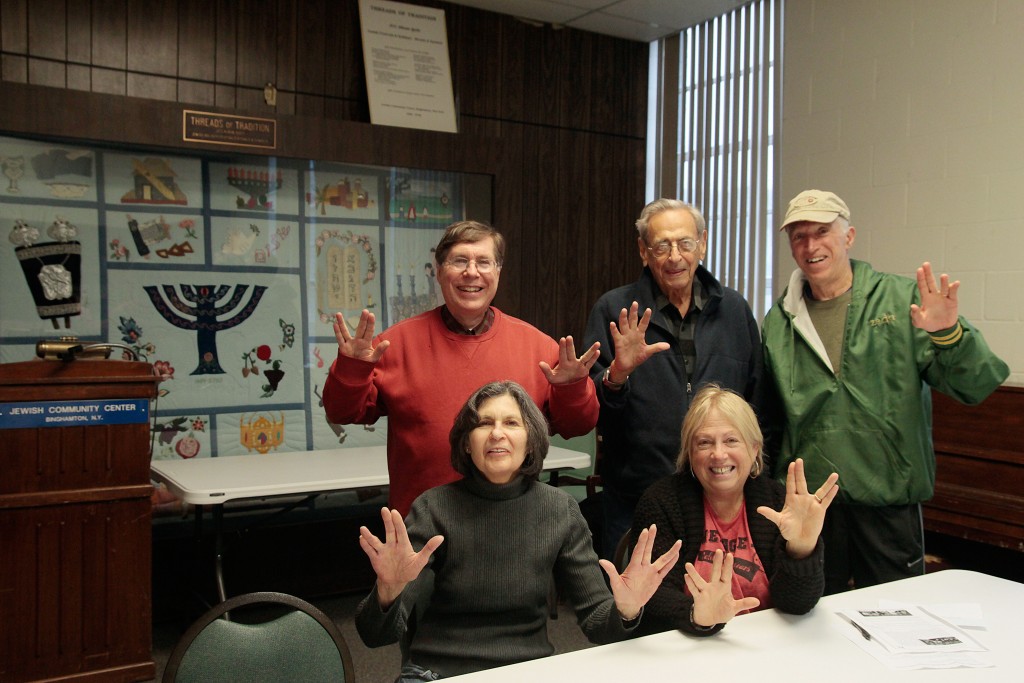
For dozens of senior citizens in the Binghamton area, every Thursday brings a chance to gather at the Vestal Jewish Community Center (JCC) to catch up over coffee. There’s only one rule: they have to speak Yiddish.
Joe Miller, 89, moved to Binghamton in 2004 from Plainview, New York, knowing no one in the Binghamton area except for his son. One day in 2009, in hopes of finding friends, Miller found an advertisement in the Press and Sun-Bulletin for a Yiddish Club that met weekly. Miller has been a regular ever since, and is currently the oldest member.
The Yiddish Club meets every Thursday from 1-2 p.m. and has done so for almost 20 years. Many members come weekly, but due to their age, some miss meetings for doctor’s appointments or because of inclement weather.
When Miller first joined, the group had 25 members, but about half have been lost due to old age or relocation. Now, according to Miller, there is no one to replenish those who left. They welcome new members, and he said students are welcome and encouraged to come as well. For him, speaking Yiddish is what makes the club great and student involvement would help expand the program and bring new perspective.
“There’s things they say in Yiddish that you can’t say in any other language,” Miller said. “We go through all the expressions because they’re hysterical and you can’t convert them to English, it’s impossible. It’s a fun language and [it’s] disappearing.”
Members of the group often reminisce on past memories, childhoods and places in Brooklyn, where many of them grew up. Aside from politics, the group can talk about anything, though most talks touch on food, recipes from their grandmothers and Jewish holidays.
“I felt I was right at home,” Miller said. “People were from Brooklyn and Queens. They knew what an egg cream was and how to find a good pastrami sandwich.”
Anyone can join the group, regardless of religion or knowledge of Yiddish. They offer help in learning the language — not in a formal instructive way, but to teach words and correct grammar. Miller describes the group as full of cultural Jews more than religious ones, and many of their discussions focus on Jewish culture and tradition.
“It’s just bringing back our life the way we knew it and the old times in the city,” Miller said. “We talk about these things and recollect: Coney Island, Jan’s Ice Cream Parlor on Jamaica Avenue, Sheepshead Bay, Manhattan Beach, the whole scene.”
Member Mickey Greenberg, the youngest in the club at 70 years old, said he joined the group primarily to feel a connection with his grandparents. He said they spoke Yiddish in their home and read the Yiddish newspaper, Der Forvitz.
“Whenever my parents did not want me to understand what they were saying, they resorted to Yiddish,” Greenberg wrote in an email. “The Yiddish group has exceeded my expectations in so many ways. A terrific bunch of people sharing a love for the language!”
According to Toni Grekin, the director of the club, the group is made up of a variety of people who agree and disagree, some of whom are loud and passionate and others who are gentle-spoken and polite.
“Some of us speak too much (me), some of us speak just enough, and some don’t speak at all, just enjoying the sound of it,” Grekin wrote in an email. “We talk a lot; we listen a little; we sing a little, we act a little, we tell jokes a little and we LAUGH A LOT!!!”


